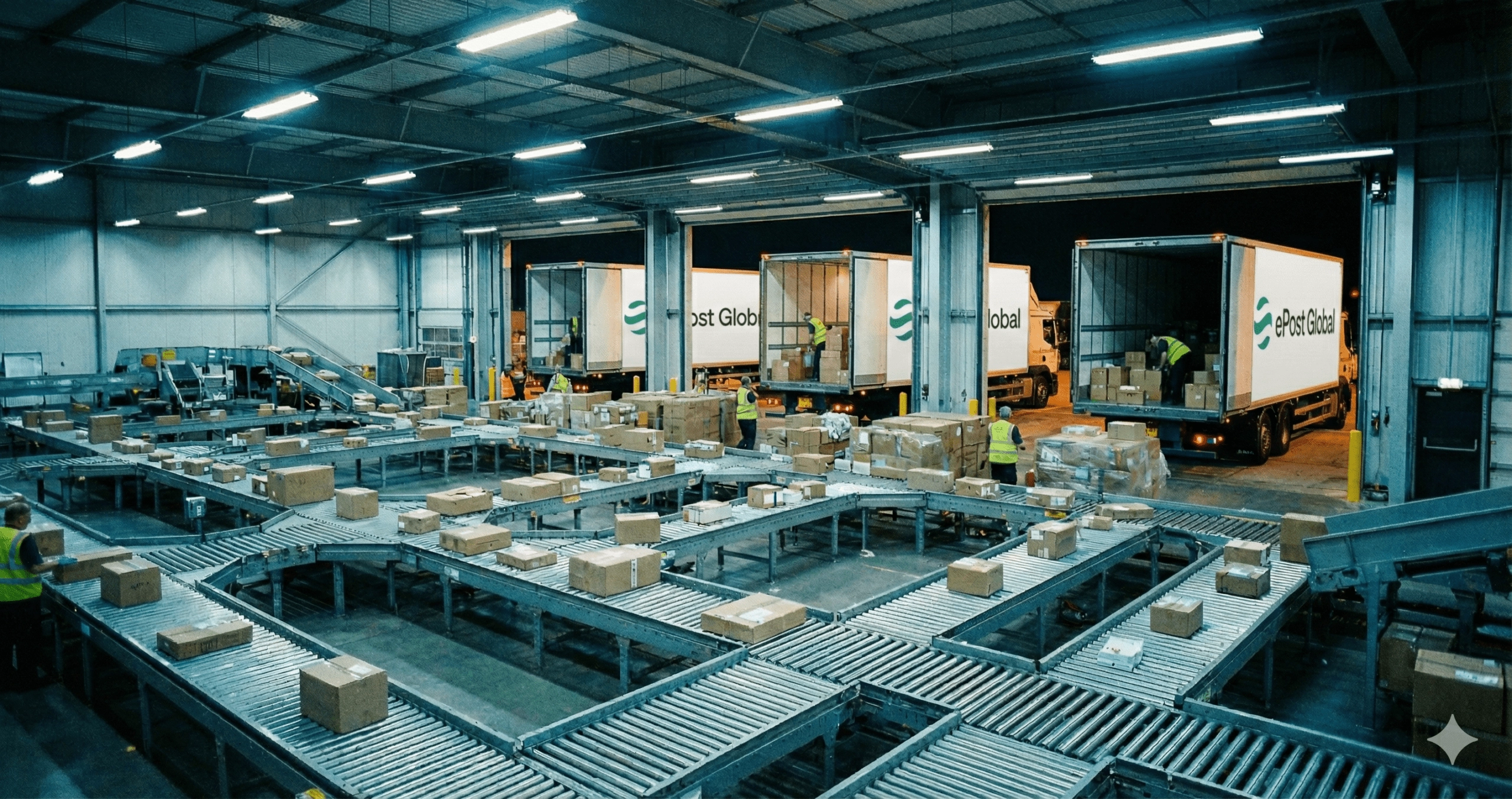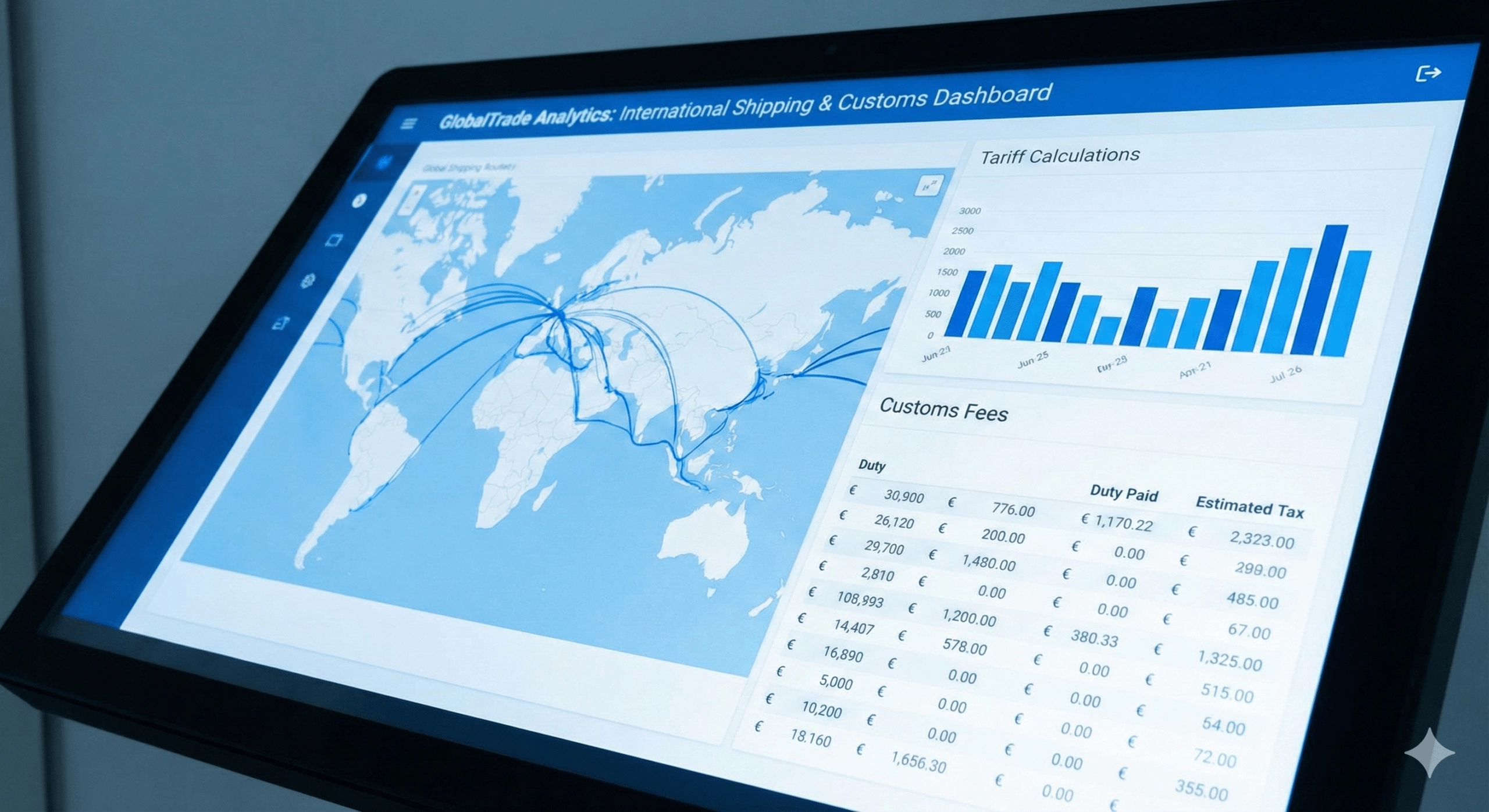Shipping concerns usually start with something small. Maybe a package doesn’t arrive when it’s supposed to, or a rate increase slips through that no one saw coming. Down the road, a delay gets blamed on the weather, but no one really explains what happened.
Over time, these little disruptions start to pile up, and the shipping process that once seemed dependable suddenly feels fragile. And that’s when the question comes into focus: What happens when your carrier can’t deliver?
Most businesses don’t find out until it’s too late. They assume their shipping setup will hold until it doesn’t, and then they’re in scramble mode.
ePost Global was built with a different mindset. We work across a global network of carriers, so there’s always another route, another option, and another solution ready to go. We stay ahead of potential issues, solving problems before they impact your delivery timeline.
That’s the difference between a vendor and a partner: A partner is ready with backup when things go wrong. Learn why relying on a carrier without a plan B could cost you more than you think, and what to look for instead.
What a Real Plan B Means in Shipping
You can't scramble to create a true plan B during a crisis. This sort of backup should already be in place and working behind the scenes, ready for when something goes wrong. It typically doesn't exist with a single-carrier setup but rather with a multicarrier logistics partner that builds flexibility into how you ship.
Here's what that looks like:
Access to Multiple Carriers
Access to multiple shipping providers means that when one carrier is overloaded, suffers delays, or goes offline, your shipments can be rerouted through another channel without disruption. For example, if your go-to carrier in Europe suddenly experiences customs backups, a logistics partner with established relationships in that region can quickly shift your packages to another provider that's moving more efficiently. You don't have to renegotiate contracts or scramble to find alternatives; it's already handled.
The Ability to Pivot Without Losing Time
When a carrier raises rates or its performance slips, you should be able to change quickly, without putting your entire operation on hold. Let's say your preferred carrier in the U.S. increases its fees right before a busy sales period. A logistics partner with built-in alternatives can shift your shipping volume to a more affordable provider that meets your delivery timelines. You stay on schedule, your shipping costs stay in check, and your customers never feel the difference.
Ongoing Rate Benchmarking
Shipping rates don’t only go up during peak season. Carriers can adjust pricing based on fuel costs, labor changes, or internal restructuring. Regular benchmarking ensures that your business isn't quietly overpaying as these changes roll out. For example, if your carrier increased rates this quarter but your competitors’ shipping costs stayed the same, it might mean you're missing out on better pricing elsewhere. A logistics partner that monitors pricing trends across the board can help you stay competitive without needing to watch the market yourself.
Customs and Compliance Expertise
International shipments are especially vulnerable to slowdowns. A small paperwork mistake or a missing document can cause packages to sit at customs for days. A shipping partner that understands the import rules for each destination can prevent such delays by catching and correcting errors before they’re ever handed off to customs. That kind of attention to detail keeps your packages moving and your customers happy.
Why Most Single-Carrier Solutions Can't Offer You a Real Plan B
All carriers are built to move packages, but not all are ready to adjust strategy when things fall apart. Single-carrier providers in particular operate within their own system, and that’s where their capabilities begin and end. If something goes wrong, there's nowhere else to turn.
They are the plan. Which means if they fail, you're stuck. When you rely on one carrier for all your shipping, you're tying your business to their performance, which means you don't have many choices if they experience service outages or staffing shortages. Suppose your carrier's tracking system goes offline during the holiday season. You're suddenly blind to package locations, customers are asking for answers, and you have no way to switch providers without starting from scratch. That kind of dependence puts your business at risk.
Their system can't redirect packages through another network. If a carrier encounters a problem with a delivery route or a sorting center, they usually can't hand off your shipment to another provider midstream. The package stays stuck in their system until it can move again. A multicarrier logistics partner, on the other hand, can pull that shipment and reroute it before the delay snowballs.
They don't offer cross-border flexibility once a shipment is in motion. International shipping adds another layer of complexity. If your carrier doesn't have built-in alternatives in other countries, it can't pivot when customs delays or local delivery issues arise. For example, if you're shipping to Germany and your carrier's local partner is overwhelmed, there's often no way to shift that delivery to another last-mile provider. A partner with multiple international connections can make that adjustment before delays reach your customer.
Customer support is reactive, not strategic. You might be able to reach someone to file a claim or check on a tracking issue, but most carriers aren't built to help you rethink your shipping process. They solve individual problems one at a time rather than help you avoid them in the first place. If your on-time delivery rate drops, their team might explain why—but they probably won't suggest how to fix it. That's the gap between customer service and long-term logistics support.
As you grow, your risk grows with them. The more you ship, the more you depend on that single system. And if it starts to crack, the impact multiplies. What might be a small issue at low volume becomes a much bigger problem during a product launch, a busy season, or an international expansion. Scaling with one carrier means your flexibility doesn't scale with you, which limits how quickly and confidently your business can grow.
ePost Global: Built to Be Your Plan A and Plan B
We're not a shipping carrier, and that's exactly the point. ePost Global is a logistics partner built around flexibility, offering access to a network of carriers and solutions that adjust as your business needs change. We're here to ensure your shipping process keeps moving, even when the unexpected happens.
A Trusted Network Across Regions
Every shipping lane comes with its challenges. What works well for West Coast fulfillment might not be ideal for the Northeast, and international routes have an entirely different set of rules. At ePost Global, we work with a curated group of carriers worldwide, so your shipments move through the best channels available for each destination. You're not locked into a one-size-fits-all option.
Real-time Analytics That Spot Problems Early
Disruptions don't usually appear out of nowhere but instead build up slowly; a delay might start at one sorting center but then spread to others. Our technology tracks these signals and flags issues before they get worse. We don't wait to act if we see a risk to your delivery timeline. We reroute or adjust as needed, keeping your shipments moving and your customers informed.
Support for International Documentation and Customs
Cross-border shipping is where many businesses start to feel out of their depth. International orders have plenty of opportunities for delay, from paperwork to shifting regulations. Our team helps you handle all of it. From ensuring your customs forms are complete to helping minimize duties and taxes, we keep your global shipments from getting stuck at the border.
Cost-Saving Strategies That Actually Work
Shipping is a major expense, especially at scale. We help decrease those costs through zone skipping, where packages are consolidated and delivered closer to their final destination before entering a carrier network. We also take advantage of carrier consolidation and negotiated rates to make sure you're not paying more than you need to. We provide long-term strategies that improve your margins without compromising on delivery time.
Client Support That's Built Around Your Business
When something goes wrong, you want answers fast. Our support team gets to know how your business runs, so we can step in with context and clarity when you need help. Whether it's a technical question or a sudden shipping spike, we're right there with you, solving problems before they grow.
Get Started Today
Shipping isn’t as predictable as it used to be. Between delays and regional disruptions, it’s become a question of when something will go wrong, not if. And when it does, your business needs more than a tracking number and a customer service ticket. You need a partner that’s already working on the solution.
That’s what we do at ePost Global. We don’t rely on one system, carrier, or way of doing things. We build shipping strategies that flex when you need them to, with the tools and experience to keep your operation moving even when the road ahead gets complicated.
If you’re rethinking how your business ships, we’re ready to help you put a better plan in place.
Let’s talk. ePost Global builds strategies that hold up when things get messy, not just when they go as planned.









